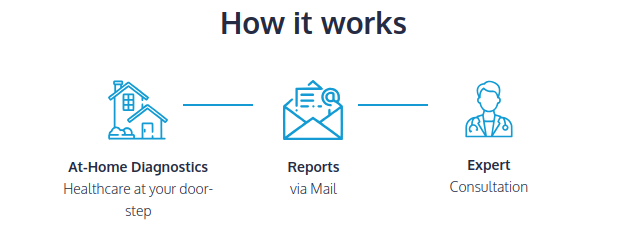Autism Test (Urine Organic Acids)
Test Parameters


What is Autism?
Autism Spectrum Disorder are complex neurodevelopmental disabilities with onset before 36 months and characterized by impairments in reciprocal social interactions, verbal and non-verbal communication skills, interests and activities. Children and adolescents with autism vary widely in abilities, intelligence, and behaviors
What are the causes of Autism
ASD is known to be influenced by genetic and environmental factors. A range of gastrointestinal disorders have been linked in the pathophysiology of ASD and studies have found that the condition is associated with abnormal gut flora. There is also the possibility of previously unrecognized etiologic connections between dysbiosis and childhood developmental problems.
Relationship between gut microflora and autism
It has been observed that altered gut microorganisms produce toxic metabolites and are absorbed in the portal circulation and accumulate in the neural tissue. These metabolites interfere with the neurotransmitter metabolism and are excreted in large amounts in urine in children. Moreover, the effect of these metabolites manifests in autistic symptoms. Therefore urine metabolic analysis is used for diagnosis, treatment and prognosis of babies with autistic symptoms.
What are the Symptoms of ASD
According to Centres of Disease Control, individuals with ASD often have problems with social, emotional, and communication skills. They might repeat certain behaviors and might not want change in their daily activities. Many people with ASD also have different ways of learning, paying attention, or reacting to things. Signs of ASD begin during early childhood and typically last throughout a person’s life.
What are the Risk factors of Autism
- Most scientists agree that genes are one of the risk factors that can make a person more likely to develop ASD
- Children who have a sibling with ASD are at a higher risk of also having ASD.
- Individuals with certain genetic or chromosomal conditions, such as fragile X syndrome or tuberous sclerosis, can have a greater chance of having ASD.
- When taken during pregnancy, the prescription drugs valproic acid and thalidomide have been linked with a higher risk of ASD.
- There is some evidence that the critical period for developing ASD occurs before, during, and immediately after birth
- Children born to older parents are at greater risk for having ASD.
Asperger syndrome vs Autism
- IQ - Compared with classic autism, people with Asperger’s syndrome have IQs that fall in the normal or even superior range. Those with autism typically have lower intelligence, as measured by standardized assessment measures.
- Speech - People with autism do not typically develop the normal abilities to use sounds and language as means of communication, whereas the speech of those with Asperger’s is intact.
- Age of detection - Typically, Asperger’s syndrome becomes noticeable when the child enters school and difficulties with socialization become apparent, whereas autism is generally observable by two years of age, even earlier, when persistent failure to engage with people is observable.
Antibiotic therapy for autism
Individuals with ASD if exposed to repeated courses of multiple antibiotic therapies may contribute to the complex relationships between gastrointestinal dysbiosis and ASD by altering the composition or stability of their normal microbial flora
- A few natural remedies for ASD include-
- Epsom salt - Epsom salt helps in getting a good sleep and calms the body.
- Gluten free diet - Gluten free diet is required for autism cure as gluten contains zonulin, a substance that causes leaky gut. Zonulin affects the blood-brain barrier and can lead to brain fog which allows the toxins to enter the brain.
- Bone broth - The amino acids and minerals present in bone broth helps in healing the leaky gut and improve mineral deficiencies and thus help in curing autism naturally.
- Poultry - Poultry products are rich in tryptophan and it helps in producing serotonin in the body. Serotonin is referred to as a calming neurotransmitter that aids in curing autism.
- Probiotics - Fermented foods such as kefir and sauerkraut contain probiotics. One can consume these probiotics as one of the best and common cures for autism
- Vitamin D3 - Vitamin D deficiency is common in autism. Vitamin D supplements are required for a healthy brain function.
- Aloe vera juice - Autistic children generally experience digestive problems like leaky gut. Aloe vera juice helps in curing the symptoms of autism and improves digestion process.
- Turmeric - Turmeric has antimicrobial and anti-inflammatory property and can be used to improve gut functions. Turmeric also helps in balancing the proper nutrient intake to reduce the symptoms of autism.
Is autism genetic?
Recent studies have shown that though Autism is primarily a neurological disorder impairing language, communication and social skills, it may have an indirect genetic predisposition. The Center for Disease Control in the United States has estimated that 1 out of every 68 children will be diagnosed to be on the Autism Disorder Spectrum.
Is autism a neurological disorder?
Yes, Autism spectrum disorder (ASD) refers to a group of complex neurodevelopmental disorders characterized by repetitive and characteristic patterns of behavior and difficulties with social communication and interaction. The symptoms are present from early childhood and affect daily functioning.
Can autism be screened during pregnancy?No, Autism cannot be detected during pregnancy
What is asperger syndrome?Asperger’s syndrome (AS) is one of a group of neurological disorders known as autism spectrum disorders (ASDs). AS is considered to be on the mild end of the spectrum. People with AS exhibit three primary symptoms:
- having difficulty with social interaction
- engaging in repetitive behavior
- standing firm on what they think
- focusing on rules and routine
- Be kind and nice - Avoid questioning and instead focus on optimism and reassurance. A compliment or encouraging comment can set up the framework for a lasting friendship.
- Be patient
- Listen carefully - People with Aspergers process communication solely on word processing and not subtle facial cues, so they might semantically misunderstand the meaning of the words you use.






